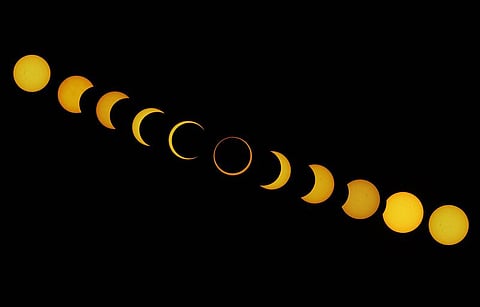Total solar eclipse in 2027: 11 countries to witness 6+ minutes of darkness
Longest solar eclipse of the century to dazzle 11 nations in 2027

Skywatchers are in for a spectacular show on Saturday, August 2, 2027, as the longest total solar eclipse of the century darkens skies for an estimated 6 minutes and 22 seconds at its peak.
This rare alignment will occur as the moon reaches perigee—its closest point to Earth—allowing it to completely obscure the sun and plunge daytime into temporary darkness.
Path of totality spans 11 countries
The path of totality will stretch across 11 countries, nine of them in the Arab world: Morocco, Algeria, Tunisia, Libya, Egypt, Sudan, Saudi Arabia, Yemen, and Somalia.
The eclipse will also be visible in Gibraltar and southern Spain. In total, the shadow will travel across a path approximately 258 kilometres wide, covering over 2.5 million square kilometres.
Timings: from first contact to last light
According to astronomical forecasts, the eclipse will begin as a partial eclipse at 7:30 am local time.
Totality will begin around 8:23 am.
The maximum eclipse is expected at 10:07 am.
Totality will end by 11:50 am, followed by a final partial phase until 12:44 pm.
A spectacle unmatched this century
This eclipse stands out due to the near-perfect alignment of the sun, moon, and Earth—something that will not be replicated again in this century with the same duration or scale.
While parts of Europe, Africa, and Asia will witness a partial eclipse, most of North America, large parts of Asia, and all of Australia will miss the event entirely.
Mark your calendars: next eclipses
Though a partial solar eclipse is expected on September 21, 2025, astronomers say it will pale in comparison to the grandeur of the 2027 total eclipse.
The August 2027 event is being billed as an unmissable moment for astronomers, researchers, and anyone captivated by the rare choreography of the cosmos.
Sign up for the Daily Briefing
Get the latest news and updates straight to your inbox






